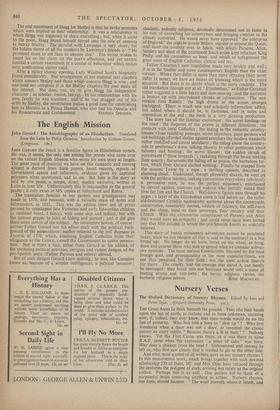The English Mission
John Gerard : The Autobiography of an Elizabethan. Translated from the Latin by Philip Caraman. Introduction by Graham Greene.
(Longmans. i Ss.)
JOHN GERARD the Jesuit is a familiar figure in Elizabethan annals. He was, it seems, the only one among the priests who came over on the valiant English Mission who wrote his own story at length. The great mass of material we have on this romantic and moving subject is derived from State papers, Jesuit records, reports of Government agents and informers, evidence given by captured prisoners when questioned, and so on. But here is the story as told by one priest, a simple, direct, modest narrative, written in Latin in later life. Unfortunately this is inaccessible to the general teader ; it only exists in MS. copies at Stonyhurst and Rome.
The translation familiar to our parents and grandparents was made in 1870, and reissued, with a valuable mass of notes and Rnformation, in 1881. This was the edition (now out of print) perused by omnilegent late Victorian and early Edwardian children (a vanished breed, I fancy), with some skip and tedium, but with the interest proper to tales of hiding and pursuit ; and it did give them some notion of the subject. An incomplete notion, of course: neither Father Gerard nor his editor dealt with the political back- ground of the persecutions : neither referred to the bull Regnans in Excelsis of 1570, which, absolving English Catholics from their allegiance to the Crown, roused the Government to active persecu- tion. Nor is there a hint, either from Gerard or his editors, of the unceasing political activities, intrigues and violent designs, of the pro-Spanish party (Father Parsons and others) abroad.
But of such designs Gerard knew nothing ; he was, like Campion (more so, because of a simpler intelligence), a political innocent ;
idealistic, ardently religious, devotedly determined not to tatter in his task of converting his countrymen and bringing comfort to the already converted. He would never have approved "the enterprise of England," the plots to invade Britain, murder or depose the Queen, and hand the country over to Spain, with which Parsons, Allen, Sanders and most of the prominent Jesuit exiles kept reluctant King Philip and his counsellors so busy, and which so antagonised the great mass of English Catholics, clerical and lay.
Father Caraman's new translation reads very briskly and well ; it is in far livelier and more contemporary English than the older version. Where they differ in more than mere phrasing (they never differ in sense), we have no means ,of knowing which is the more accurate. But there is no doubt which is the more readable. The old translation (though not at all "Elizabethan," as Father Caraman rather suggests) is a little heavy and slow-moving ; and the narrative is broken up with interpolated chunks of information. The new version runs fluently ; the high drama of the scenes emerges unclogged. There is much new and scholarly information added, but added where it should be, in footnotes, and in notes and appendices at the end ; the book is a very pleasing production.
The story has all the familiar excitement: the secret landings on the coast ; the dispersal of the priests in different directions ; the contacts with loyal Catholics ; the hiding in the romantic country- houses whose rambling passages, secret chambers, great gardens and out-buildings afforded shelter against searchers (by modern standards rather unskilled and casual searchers) ; the riding about the country- side in gentleman's dress, talking phonily to other gentlemen abottt falconry and hunting ; the secret Masses ; the sudden inrush of pursuivants (" these leopards "), racketing through the house seeking their quarry ; the arrests, the haling off to prison, the barbarous tor- ture, which from Gerard elicited nothing. Finally he escaped from the mated Tower by a rope ; a thrilling episode, described in alarming detail. Undaunted, though physically shaken, he went on with the perilous mission, making conversions everywhere (obviously a persuasive man, he was the perfect missioner), entertained by devout squires, matrons and widows who joyfully risked their lives for him and the Church. Well-known figures pass through his pages ; a layer of the Elizabethan scene is laid before us: the rather old-fashioned Catholic squirearchy scattered about the countryside, conservative, reasonably devout, addicts of falconry, the still-room and the chase, loyal to their sovereign, their country and their Church. With the ultramarine conspiracies of Parsons and Allen they would have no sympathy ; and could never have been turned into that fifth column in which the pro-Spanish Jesuits so wishfully believed.
This story of heroic missionary adventures cannot be paralleled today, since we live (despite all that is said to the contrary) in a less brutal age. No longer do we burn, break on the wheel, or hang, draw and quarter those who seek to spread what we consider subver- sive opinions. The most zealous Communists, financed by the most foreign gold, and propaganding in the most capitalist /lands, are not thus penalised for their faith ; nor the most ardent liberals for theirs. The cruelty, and the courage that dared it, can hardly be envisaged: they break into our humaner world with a noise of beating drums and tom-toms ; the heroic religious virtues, the





















































 Previous page
Previous page